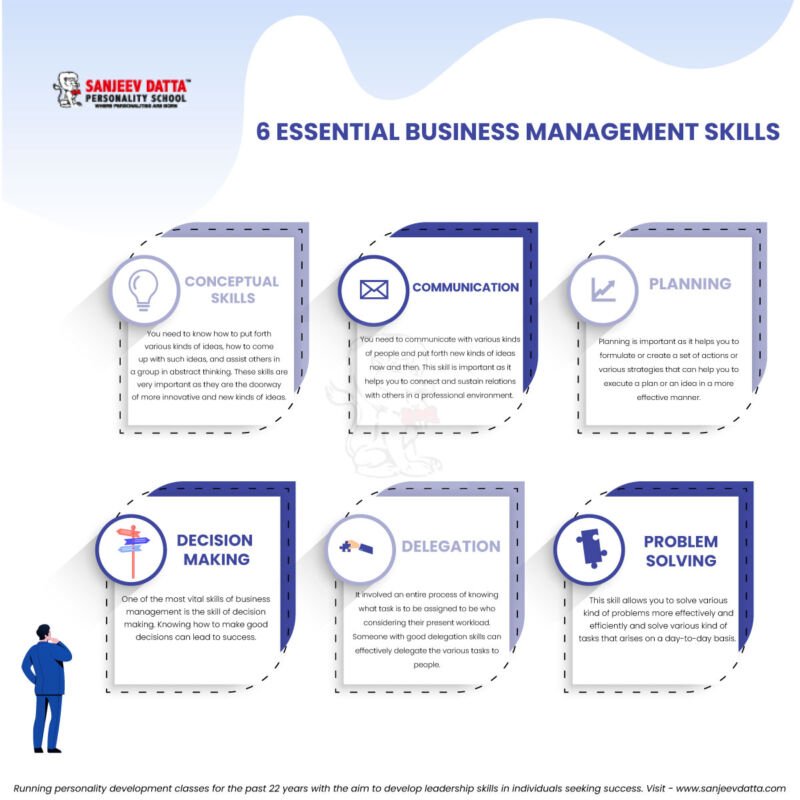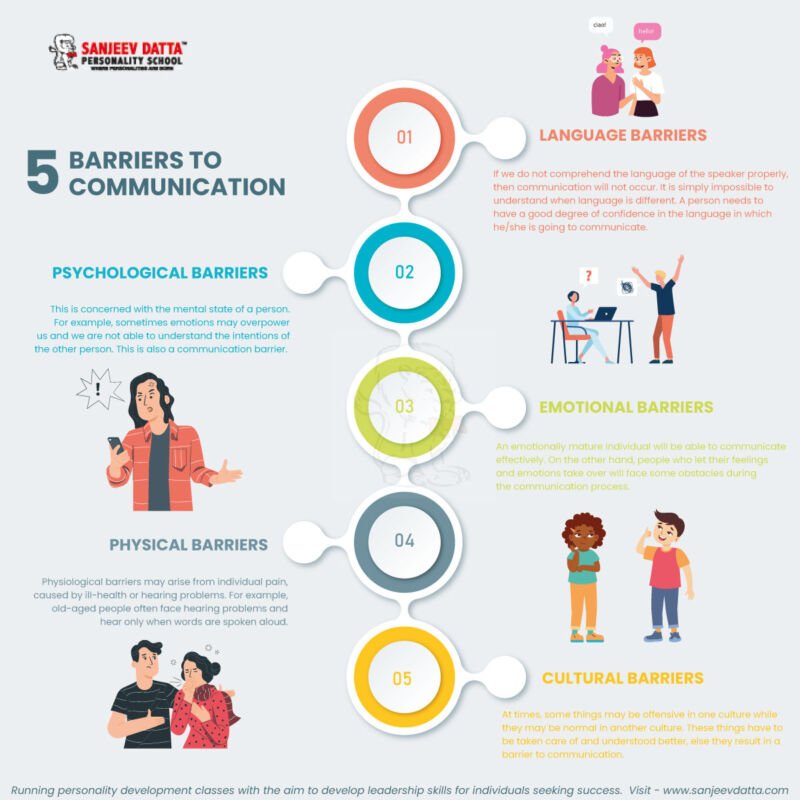Here’s something most business schools won’t tell you: your technical skills might get you started, but your personality will determine how far you actually go. Think about every successful entrepreneur you admire. Sure, they’re smart, but what really sets them apart? It’s their ability to inspire, adapt, communicate, and bounce back from failures that would crush most people. Personality development for entrepreneurs isn’t just some feel-good concept: it’s the secret weapon that transforms good business owners into industry leaders. You know that nagging feeling that something’s holding you back from reaching the next level? Nine times out of ten, it’s not your business strategy or market conditions. It’s the person staring back at you in the mirror.
The crazy part? Most entrepreneurs spend thousands on marketing courses and business coaching, but completely ignore developing the one asset that controls everything else: themselves. Let’s change that today.
The Foundation: Understanding Personality Development for Business Success
What Personality Development Really Means for Entrepreneurs?
Personality development goes way beyond just “being more confident” or “learning to network better.” It’s about fundamentally rewiring how you think, respond, and interact with the world around your business.
Successful entrepreneurs have a distinct personality trait that sets them apart from other organizational leaders: a sense of curiosity. This curiosity drives continuous learning and opportunity recognition that separates thriving businesses from stagnant ones.
Research shows that personality development impacts every aspect of entrepreneurial success:
- Decision-making speed and accuracy
- Team leadership and motivation
- Investor relations and funding success
- Customer relationship building
- Stress management during crises
The Science Behind Entrepreneurial Personality Traits
Recent studies have revealed fascinating insights about what makes entrepreneurs tick. Professor Matz and Freiberg found that conscientiousness and neuroticism are the two traits that most consistently predict startup outcomes, with higher levels of neuroticism among founders linked to a funding gap of approximately $90,000.
This research proves that personality isn’t just about being likable – it directly impacts your bottom line. The entrepreneurs who understand and actively develop their personalities gain measurable advantages in fundraising, team building, and overall business performance.

Core Benefits: How Personality Development Transforms Your Business
1. Enhanced Leadership Capabilities
The most obvious benefit of personality development is becoming a better leader. But what does that actually mean in practical terms?
Improved Decision-Making Under Pressure:
- Faster processing of complex information
- Better risk assessment and management
- Increased confidence in high-stakes situations
- Clearer communication of decisions to teams
Team Inspiration and Motivation:
- Ability to articulate compelling visions
- Skills to motivate during challenging times
- Building trust and loyalty among employees
- Creating positive company culture
Self-awareness and emotional intelligence are fundamental aspects of personal development and play a crucial role in business success. When you understand your own emotions and reactions, you can better manage your responses and lead others more effectively.
2. Improved Communication and Networking Skills
Entrepreneurship is fundamentally about relationships: with customers, investors, partners, and employees. Your personality development directly impacts every single one of these interactions.
Customer Relations Benefits:
- Better understanding of client needs
- More persuasive sales presentations
- Stronger customer loyalty and retention
- Enhanced reputation and word-of-mouth marketing
Investor and Partnership Success:
- More compelling fundraising pitches
- Stronger negotiation outcomes
- Better due diligence presentations
- Long-term relationship building
The entrepreneurs who invest in developing strong personality development skills find themselves naturally attracting better opportunities, partnerships, and team members. These skills become a competitive advantage that can’t be easily replicated by competitors.

3. Increased Resilience and Stress Management
Entrepreneurship is brutal. The statistics are clear: most startups fail, and even successful ones go through periods that would break most people. This is where personality development becomes absolutely critical.
Building Mental Toughness:
- Better handling of rejection and setbacks
- Faster recovery from failures
- Maintained optimism during difficult periods
- Ability to see opportunities in challenges
Stress Management Techniques:
- Improved work-life balance
- Better delegation and time management
- Reduced anxiety and decision paralysis
- Enhanced problem-solving under pressure
Resilience has emerged as a critical competency, both for employees and organizations, with business leaders needing to prioritize building a resilient workforce by modeling resilience.
4. Specific Personality Traits That Drive Entrepreneurial Success
Self-Awareness: The Foundation of Everything
Self-awareness isn’t just knowing your strengths and weaknesses: it’s understanding your triggers, biases, and automatic responses in different situations.
Benefits of Enhanced Self-Awareness:
- Better hiring decisions based on complementary skills
- Recognition of when to seek advice or partnerships
- Improved conflict resolution
- More authentic leadership style
Developing Self-Awareness:
- Regular self-reflection and journaling
- Seeking feedback from trusted advisors
- Personality assessments and analysis
- Mindfulness and meditation practices
5. Adaptability: Thriving in Constant Change
The business world changes fast, and entrepreneurs who can’t adapt get left behind. Entrepreneurs come in all shapes and sizes, but successful entrepreneurs tend to be highly adaptable and able to stay focused on their goals.
Why Adaptability Matters:
- Market conditions change rapidly
- New technologies disrupt industries
- Customer preferences evolve
- Economic conditions fluctuate
Building Adaptability Skills:
- Embracing failure as learning opportunity
- Staying curious about industry trends
- Practicing flexible thinking exercises
- Building diverse networks and perspectives
personality development for career change
6. Emotional Intelligence: Managing Relationships
Emotional intelligence might be the most underrated entrepreneurial skill. It affects everything from team management to customer service to investor relations.
Components of Emotional Intelligence:
- Self-regulation under stress
- Empathy for customers and employees
- Social skills for networking and partnerships
- Motivation to persist through challenges
Practical Applications:
- Diffusing tense negotiations
- Motivating demoralized teams
- Understanding unspoken customer needs
- Building trust with stakeholders
The ROI of Personality Development: Measurable Business Impact

1. Financial Returns on Personal Investment
Let’s talk numbers because that’s what entrepreneurs care about. Investing in personality development isn’t just good for your soul: it’s good for your bank account.
Direct Financial Benefits:
- Increased funding success rates
- Higher employee retention reducing hiring costs
- Better customer lifetime value
- Improved negotiation outcomes
Indirect Financial Benefits:
- Faster business growth through better leadership
- Reduced stress-related health costs
- More opportunities through stronger networks
- Better strategic partnerships
Benefits of prioritizing personal development include enhanced self-awareness and emotional intelligence, increased resilience in the face of setbacks and challenges, and improved decision-making and problem-solving abilities.
2. Long-Term Competitive Advantages
The beautiful thing about personality development is that it creates sustainable competitive advantages that competitors can’t easily copy or replicate.
Sustainable Advantages:
- Authentic personal brand
- Strong industry relationships
- Reputation for integrity and competence
- Natural ability to attract top talent

Practical Strategies: How to Develop Your Entrepreneurial Personality
1. Daily Habits for Continuous Growth
Personality development isn’t a weekend workshop: it’s a daily practice that requires consistency and commitment.
Morning Routines for Growth:
- Meditation or mindfulness practice
- Goal setting and intention planning
- Reading or learning new concepts
- Physical exercise for mental clarity
Evening Reflection Practices:
- Journaling about daily interactions
- Analyzing decision-making processes
- Planning improvements for tomorrow
- Gratitude and positive mindset exercises
2. Learning from Failure and Setbacks
Every entrepreneur faces failures, but the successful ones use these experiences as personality development opportunities rather than just business learning.
Reframing Failure:
- Viewing setbacks as data points
- Extracting personal growth lessons
- Building resilience through experience
- Developing problem-solving confidence
Growth Mindset Development:
- Embracing challenges as opportunities
- Persisting through obstacles
- Learning from criticism
- Finding inspiration in others’ success
For entrepreneurs serious about accelerating their growth, investing in a structured personality development course can provide the framework, accountability, and expert guidance needed to make rapid improvements while avoiding common pitfalls that slow progress.

3. Building Emotional Resilience
Emotional resilience might be the most valuable skill an entrepreneur can develop. It’s what allows you to keep going when everyone else would quit.
Resilience Building Techniques:
- Stress inoculation through controlled challenges
- Building support networks and mentorship
- Developing coping strategies for different scenarios
- Practicing optimism and positive self-talk
Recovery and Renewal:
- Taking breaks to prevent burnout
- Engaging in activities outside business
- Maintaining physical and mental health
- Celebrating small wins and progress
Advanced Personality Development: Taking It to the Next Level
1. Leadership Presence and Charisma
Some entrepreneurs naturally command attention when they walk into a room, while others have to work at it. The good news? Presence and charisma can be developed.
Elements of Leadership Presence:
- Confident body language and posture
- Clear and compelling communication
- Authentic emotional expression
- Ability to remain calm under pressure
Developing Charismatic Communication:
- Storytelling skills for presentations
- Active listening and engagement
- Adapting communication style to audience
- Using humor and personality appropriately
2. Strategic Thinking and Vision Development
Great entrepreneurs don’t just react to their environment – they shape it through strategic thinking and compelling vision creation.
Strategic Thinking Skills:
- Systems thinking and pattern recognition
- Long-term planning with short-term flexibility
- Understanding market dynamics and trends
- Risk assessment and scenario planning
Vision Communication:
- Articulating compelling futures
- Inspiring others to join the mission
- Adapting message for different audiences
- Maintaining consistency across communications
components of personal excellence
3. Cultural Intelligence and Global Mindset
In today’s interconnected world, entrepreneurs need cultural intelligence to succeed in diverse markets and build inclusive teams.
Cultural Intelligence Components:
- Understanding different cultural values
- Adapting communication styles appropriately
- Building inclusive team environments
- Navigating international business relationships
Global Mindset Development:
- Learning about different markets
- Building diverse networks
- Understanding global trends and forces
- Developing language and cultural skills
Measuring Progress: Tracking Your Personality Development Journey
1. Key Performance Indicators for Personal Growth
How do you know if your personality development efforts are actually working? You need measurable indicators that show real progress.
Quantitative Measures:
- Employee satisfaction and retention rates
- Customer satisfaction and loyalty metrics
- Fundraising success and investor feedback
- Network growth and relationship quality
Qualitative Measures:
- Feedback from team members and peers
- Self-assessment and reflection insights
- Stress levels and work-life balance
- Overall life satisfaction and fulfillment
2. Regular Assessment and Adjustment
Personality development is an ongoing process that requires regular assessment and course correction.
Monthly Reviews:
- Progress toward specific development goals
- Feedback collection from key stakeholders
- Analysis of challenging situations and responses
- Planning adjustments for next month
Quarterly Deep Dives:
- Comprehensive personality assessments
- 360-degree feedback from team and advisors
- Major goal setting and strategy adjustment
- Investment in new learning opportunities
Common Mistakes and How to Avoid Them
1. Trying to Change Everything at Once
The biggest mistake entrepreneurs make in personality development is trying to transform everything simultaneously. This leads to overwhelm and ultimately abandoning the effort.
Better Approach:
- Focus on one or two key areas at a time
- Set specific, measurable goals
- Create accountability systems
- Celebrate small wins along the way
2. Focusing Only on Weaknesses
While addressing weaknesses is important, the biggest returns often come from amplifying your natural strengths.
Balanced Development Strategy:
- Identify and leverage natural strengths
- Address weaknesses that limit growth
- Build complementary team members
- Focus energy where you’ll see biggest impact
3. Neglecting the Implementation Gap
Reading about personality development and actually implementing changes are completely different things.
Implementation Success Factors:
- Regular practice and repetition
- Getting feedback on progress
- Making adjustments based on results
- Staying committed during difficult periods
Frequently Asked Questions (FAQs)
Q. What is personality development for entrepreneurs and why does it matter?
Personality development for entrepreneurs is the intentional process of improving personal characteristics, emotional intelligence, communication skills, and behavioral patterns that directly impact business success. It matters because your personality affects every aspect of your business – from team leadership and customer relations to investor meetings and strategic decision-making. Research shows that entrepreneurs with developed personalities achieve better funding outcomes, higher employee retention, and stronger business performance.
Q. How long does it take to see results from personality development efforts?
The timeline for personality development varies, but most entrepreneurs start seeing initial results within 30-60 days of consistent practice. Small behavioral changes can show immediate impact in daily interactions, while deeper personality shifts typically take 3-6 months of dedicated effort. The key is consistency – daily practice with weekly assessment and monthly goal adjustment will accelerate your progress significantly.
Q. What are the most important personality development skills for entrepreneurs?
The most critical personality development skills include self-awareness, emotional intelligence, adaptability, resilience, communication effectiveness, and strategic thinking. Self-awareness forms the foundation because you can’t improve what you don’t understand about yourself. Emotional intelligence helps you manage relationships with team members, customers, and investors. Adaptability and resilience are essential for navigating the inevitable challenges of entrepreneurship.
Q. Can personality development really impact my business financial performance?
Absolutely. Studies show that personality development creates measurable financial returns through improved fundraising success (research indicates personality factors can impact funding by tens of thousands of dollars), higher employee retention rates, better customer satisfaction scores, and more effective negotiations. Entrepreneurs with developed personalities also tend to build stronger networks, attract better partnerships, and make more strategic decisions that improve long-term profitability.
Q. Should I invest in a personality development course or try to develop these skills on my own?
While self-directed learning can be valuable, a structured personality development course offers several advantages including expert guidance, proven frameworks, accountability systems, and peer learning opportunities. Professional courses help you avoid common mistakes, accelerate your progress, and provide objective feedback that’s difficult to get on your own. Consider your learning style, available time, and budget when making this decision.
Q. How do I measure progress in personality development?
Track both quantitative and qualitative indicators. Quantitative measures include employee satisfaction scores, customer retention rates, fundraising success, and network growth. Qualitative measures involve feedback from team members, self-reflection insights, stress levels, and overall life satisfaction. Conduct monthly mini-assessments and quarterly comprehensive reviews to ensure you’re making meaningful progress toward your development goals.
Q. What’s the biggest mistake entrepreneurs make in personality development?
The most common mistake is trying to change everything at once, leading to overwhelm and abandonment of the effort. Successful personality development requires focusing on one or two key areas at a time, setting specific measurable goals, and maintaining consistency over months rather than weeks. Another major mistake is focusing only on weaknesses while ignoring natural strengths that could be amplified for greater business impact.
Q. How does personality development differ from business skill development?
While business skills focus on technical competencies like marketing, finance, or operations, personality development addresses the personal characteristics that determine how effectively you apply those business skills. Your personality affects your leadership style, decision-making process, stress management, and relationship building – all of which multiply the impact of your technical business knowledge. Both are important, but personality development often provides higher leverage for overall success.
Conclusion: Your Personality Is Your Ultimate Business Asset
Here’s the bottom line that most entrepreneurs miss: you are your business’s most valuable asset, and personality development for entrepreneurs is the highest-ROI investment you’ll ever make. While your competitors are obsessing over the latest marketing tactics or productivity hacks, you have the opportunity to develop the one thing they can’t copy: yourself.
Think about where you’ll be in five years if you commit to intentional personality development starting today. Better leadership skills, stronger relationships, improved decision-making under pressure, and the kind of authentic confidence that attracts opportunities, team members, and investors naturally. Compare that to five years of staying exactly where you are now: same stress patterns, same communication challenges, same limiting beliefs holding you back.
The entrepreneurs who understand this don’t treat personality development as a nice-to-have luxury. They treat it as mission-critical business infrastructure. Your personality affects every email you send, every meeting you lead, every decision you make, and every relationship you build.
Start with one area. Pick the personality trait that, if improved, would have the biggest impact on your business in the next 90 days. Maybe it’s emotional intelligence for better team management, or resilience for handling the inevitable setbacks, or communication skills for that upcoming investor presentation.
The choice is yours, but remember: your personality is working for or against your business every single day. Isn’t it time you made sure it’s working in your favor?


